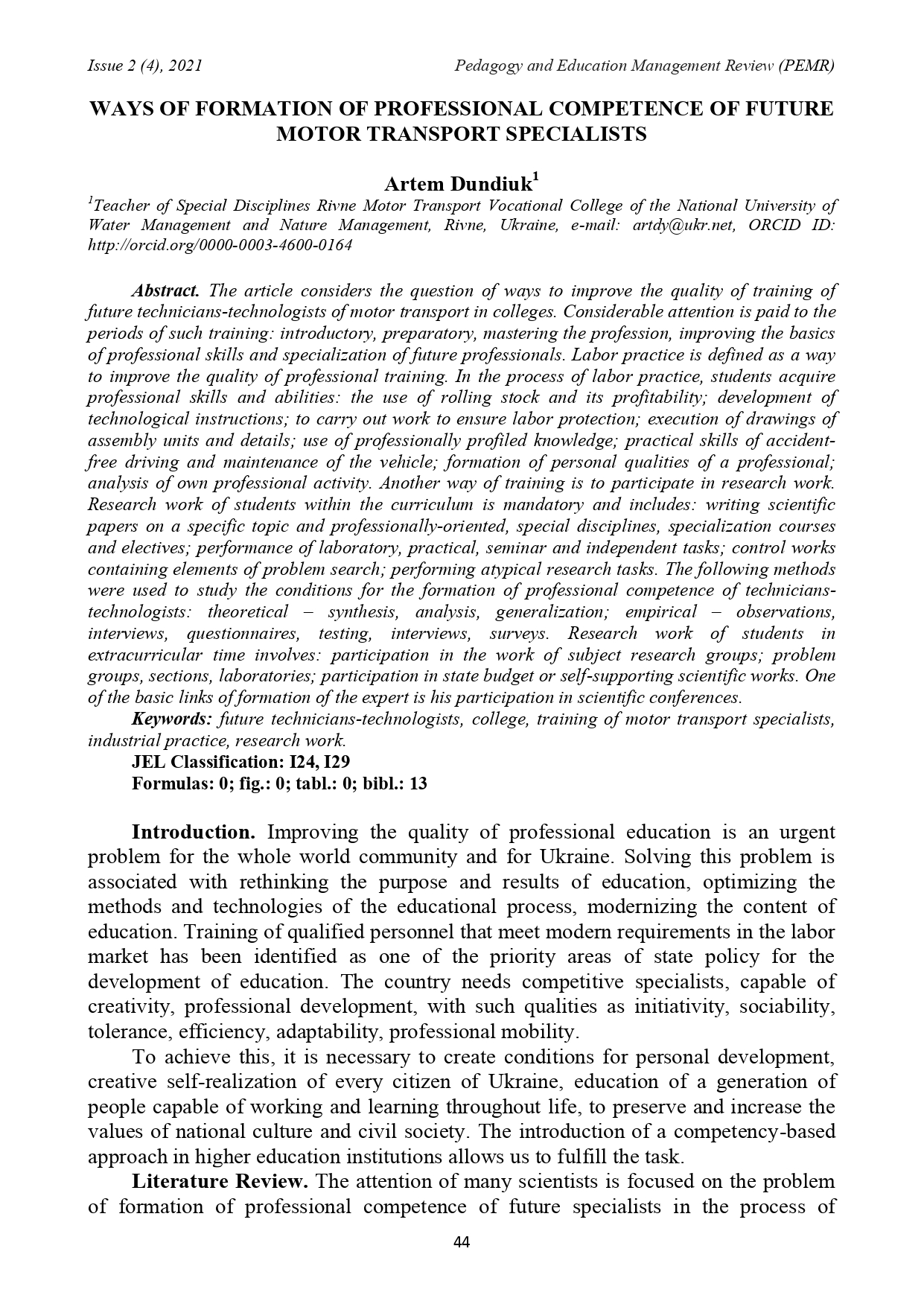WAYS OF FORMATION OF PROFESSIONAL COMPETENCE OF FUTURE MOTOR TRANSPORT SPECIALISTS
DOI:
https://doi.org/10.36690/2733-2039-2021-2-44Keywords:
future technicians-technologists, college, training of motor transport specialists, industrial practice, research workAbstract
The article considers the question of ways to improve the quality of training of future technicians-technologists of motor transport in colleges. Considerable attention is paid to the periods of such training: introductory, preparatory, mastering the profession, improving the basics of professional skills and specialization of future professionals. Labor practice is defined as a way to improve the quality of professional training. In the process of labor practice, students acquire professional skills and abilities: the use of rolling stock and its profitability; development of technological instructions; to carry out work to ensure labor protection; execution of drawings of assembly units and details; use of professionally profiled knowledge; practical skills of accident-free driving and maintenance of the vehicle; formation of personal qualities of a professional; analysis of own professional activity. Another way of training is to participate in research work. Research work of students within the curriculum is mandatory and includes: writing scientific papers on a specific topic and professionally-oriented, special disciplines, specialization courses and electives; performance of laboratory, practical, seminar and independent tasks; control works containing elements of problem search; performing atypical research tasks. The following methods were used to study the conditions for the formation of professional competence of technicians-technologists: theoretical – synthesis, analysis, generalization; empirical – observations, interviews, questionnaires, testing, interviews, surveys. Research work of students in extracurricular time involves: participation in the work of subject research groups; problem groups, sections, laboratories; participation in state budget or self-supporting scientific works. One of the basic links of formation of the expert is his participation in scientific conferences.
Downloads
References
Adariukova L.B. (2017) Rozvytok motyvatsiino-tsinnisnoho vidnoshennia studentiv do samoosvitnoi diialnosti yak umova formuvannia samoosvitnoi kompetentnosti [Development of motivational and value attitude of students to self-educational activity as a condition of formation of self-educational competence] Dukhovnist osobystosti: metodolohiia, teoriia i praktyka. Vyp. 6(81). S. 6-12. [in Ukrainian].
Herman Ye.O. (2008) Sotsialno-psykholohichna identychnist suchasnoho studenta [Socio-psychological identity of a modern student]. Visnyk NTUU «KPI». Filosofiia. Pedahohika. Psykholohiia. Vypusk 1(22). S. 30-34. [in Ukrainian].
Horkunenko P.I. (2007) Pidhotovka studentiv pedahohichnoho koledzhu do naukovo-doslidnoi roboty [Preparation of students of pedagogical college for research work]: dys. … kand. Nauk: 13.00.04 Vinnytsia, 265 s. [in Ukrainian].
Zeer E., Simanyuk E. (2005) Kompetentnosnyiy podhod k modernizatsii professionalnogo obrazovaniya [Competence-based approach to the modernization of vocational education] Vyisshee obrazovanie v Rossii. №4. S. 23 - 30. [in Russian].
Klovak H.T. (2003) Osnovy pedahohichnykh doslidzhen [Fundamentals of pedagogical research] Navchalnyi posibnyk dlia vyshchykh pedahohichnykh navchalnykh zakladiv. Chernihiv. 260 s. [in Ukrainian].
Kompetentnisnyi pidkhid u suchasnii osviti: svitovyi dosvid ta ukrainski perspektyvy. [Competence approach in modern education: world experience and Ukrainian perspectives] Biblioteka z osvitnoi polityky (2004) [pid zah. red. O. V. Ovcharuk] K. 112 s. [in Ukrainian].
Krushelnytska O.V. (2006) Metodolohiia ta orhanizatsiia naukovykh doslidzhen. [Methodology and organization of scientific research]. Navchalnyi posibnyk. K.: Kondor. 206 s. [in Ukrainian].
Lyubimova G.Yu. (2000) Ot pervokursnika do vyipusknika: problemyi professionalnogo i lichnostnogo samoopredeleniya studentov. [From freshman to graduate: problems of professional and personal self-determination of students] Vestn. Mosk. un-ta. Ser. 14. Psihologiya. № 1. S.34-37. [in Russian].
Moroz O.H., Padalka O.S., Yurchenko V.I. (2003) Pedahohika i psykholohiia vyshchoi shkoly [Pedagogy and psychology of high school]. Navchalnyi posibnyk [Za zah. red. O.H. Moroza]. K.: NPU, 267s. [in Ukrainian].
Rodyhina I.V. (2008) Kompetentnisno oriientovanyi pidkhid do navchannia [Competence-oriented approach to learning] Seriia «Administratoru shkoly» Kh.: Vyd. hrupa «Osnova», 112 s. [in Ukrainian].
Serhiichuk O.M. (2009) Orhanizatsiia pedahohichnoi praktyky u pedahohichnomu universyteti [Organization of pedagogical practice in pedagogical university]: navch.-metod. posibnyk [dlia studentiv, mahistrantiv pedah. un-tiv] Pereiaslav-Khm., 128 s. [in Ukrainian].
Sysoieva S. (2015) Riznytsia poniat. Chy postrazhdaie zmist zakonu? [The difference of concepts. Will the content of the law be affected?] Osvita: Vseukrainskyi hromadsko-politychnyi tyzhnevyk. № 26-27 (5669-5670). 17-24 chervnia. S. 8. [in Ukrainian].
Skakun V.A. (2007) Organizatsiya i metodika professionalnogo obucheniya [Organization and methodology of vocational training]: Uchebnoe posobie. M.: FORUM INFRA. 336s. [in Russian].






